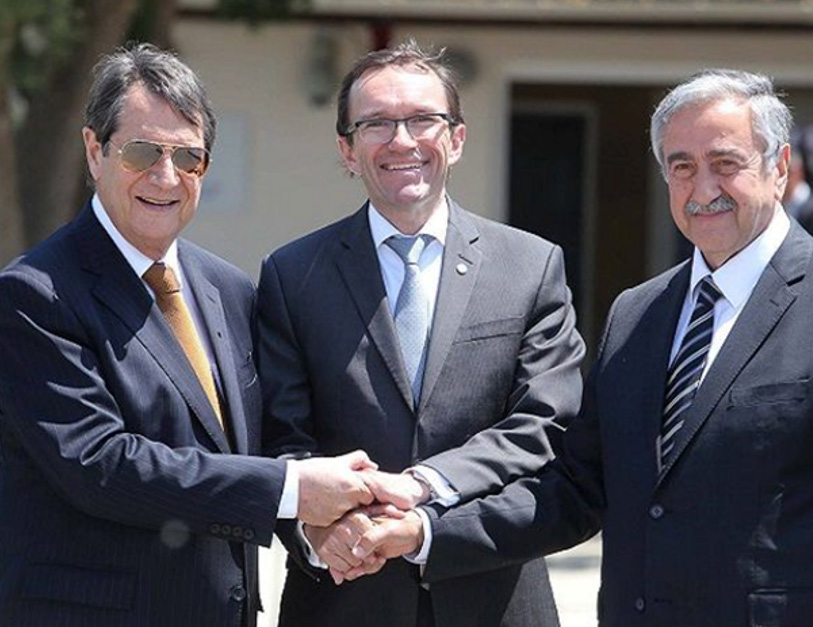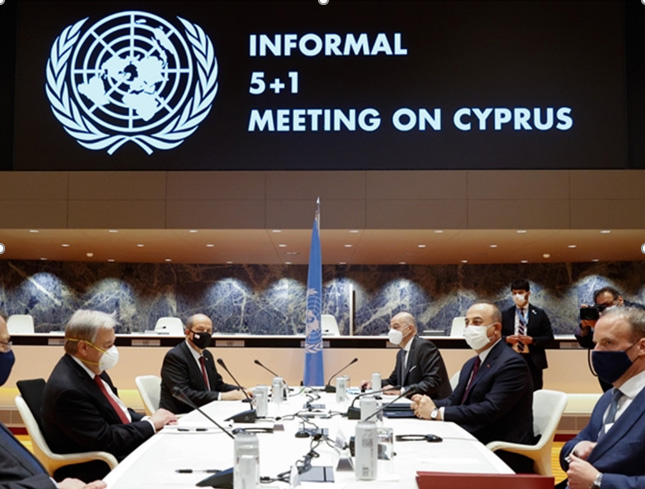If we want a solution, we must be willing to part with old ways, and make women not only a part but an indispensable part of the peace process
By Emily Yiolitis
Venus was born in Cyprus. According to legend, Venus, or Aphrodite as she is known in Greek, Goddess of love, beauty and fertility was born out of the sea-foam on the shores of Paphos, hence her name which comes from the Greek word αφρός (pronounced aphros), which means foam. It is only the natural way of things, that such a beautiful island, the island where beauty personified was born, (and which incidentally was rich in copper reserves and strategically located for both trade and empire-building routes), would be coveted and conquered many times over its turbulent history. After centuries of subjugation, by inter alia, the Assyrians, the Egyptians, the Persians, the Lusignans, the Venetians, the Crusaders, the Ottomans and the British, Cyprus finally gained its independence in 1960. At least on paper.
Unfortunately for us, the people of Cyprus, the Cyprus Constitution of 1960 is a formidable lesson of how not to bring a troubled colony into statehood. It is a very long and highly complex, annexed document which contains a series of power-sharing concessions which may have temporarily brokered an intricate peace but essentially satisfied none of the parties signing it.
Instead of uniting the two communities of the island, Greek Cypriots and Turkish Cypriots, the new Constitution hardened the divide, by creating fixed majorities, separate assemblies, and ethno-communally determined offices, such as the president always having to be Greek Cypriot and the vice-president Turkish Cypriot, the attorney-general Greek Cypriot and the assistant attorney-general Turkish Cypriot and so on.
The Constitution also “cancelled” any notion of true sovereignty of the new state coming into being, by granting intervention rights to Greece, Turkey and Great Britain to act as guarantors of an otherwise “independent” new state.
Intercommunal strife broke out as soon as 1963 and by 1964 the UN authorised a peace-keeping force in Cyprus. There followed a decade of further estrangement and conflict which culminated in the Turkish invasion of 1974. I will not delve into the reasons, and I will not apportion blame, suffice it to say that conflict and division were pre-determined and almost a natural sequitur to a dividing Constitution, not decided by the people, but cast upon us by the “wisdom” of the then powers that were. Education has unfortunately not played a reconciliatory role since, on either side of the divide, with history books rife with propaganda, teaching Greek Cypriot and Turkish Cypriot children resentment instead of forgiveness, dwelling on our differences rather than our similarities.
Pictured above are the parties who sealed the fate of the Cyprus Constitution, the last Governor of Cyprus, Sir Hugh Foot, Archbishop Makarios on behalf of the Greek Cypriots and Dr Fazil Kutchuk on behalf of the Turkish Cypriots, signing the Treaty of Establishment of the Republic of Cyprus on 16 August 1960.
Since 1974, when Cyprus was invaded by Turkey, the island remains divided. The reunification of Cyprus has proven to be one of the world’s most elusive, intractable and longest running international problems. Several attempts have been made to broker peace.
The 2002 Annan Plan attempt is the UN’s most ambitious attempt to reach a federal solution to the Cyprus inopportunely designated “problem”. The plan was named after the then UN secretary-general, Kofi Annan brokering it, and was actively supported by the EU because Cyprus was set to join the bloc in 2004 and the EU was keen to see a reunified island join. The plan was put to referendum and was overwhelmingly rejected by the Greek Cypriot side (76 per cent) although it was endorsed by 65 per cent of Turkish Cypriots.
There were a number of reasons for the failure to muster support for the plan, one being that the president who represented us in the formulation of the plan, Tassos Papadopoulos, made a televised plea to the people to reject the plan, and the other being that the Akel secretary general Demetris Christofias who led a party in favour of a solution, appealed to his supporters “to say no so that we can cement yes”. This caused this misconception that the plan would somehow be ameliorated and brought back to the vote but in fact it took many years for the two sides to return to the negotiating table. In fairness, the Annan Plan was a very complicated, lengthy document which insisted on a bizonal bicommunal federation, with detailed quota provisions, separate majorities and weighted voting rights as well as set timeframes with no guidance as to what would happen were these timelines not met.
Pictured above, Kofi Annan, outgoing Cyprus President Glafcos Clerides, then newly elected President Tassos Papadopoulos and Turkish Cypriot leader Rauf Denktash.
Pictured above is Cyprus President Demetris Christofias and Turkish Cypriot leader Mehmet Ali Talat together with Cypriot foreign minister George Iacovou. They were meeting after Christofias’ election in 2008 renewed hopes that the island’s three-decade-long division could be resolved. After four long years, on April 21, 2012, United Nations Secretary-General Ban Ki-moon said “there is not enough progress on core issues of reunification talks for calling an international conference” and the process collapsed.
The voting-in of President Anastasiades rekindled hope because for the first time, the president of Cyprus and the Turkish Cypriot leader were old friends, who grew up together in the coastal town of Limassol with only one year age difference and had gone to school together.
In November 2016 UN special advisor Espen Barth Eide, Anastasiades, Akinci (pictured above) and their negotiation teams went to Mont Pèlerin in Switzerland for two rounds of talks which broke down without an agreement.
Pictured above, Greek, Turkish and British ministers, the UN secretary-general Antonio Guterres and the two leaders at more talks in Crans-Montana in June and July 2017. They also ended in failure.
Here are the parties of the latest UN led informal talks in Geneva on April 29, 2021, Greek Foreign Minister Nikos Dendias and Cypriot President Nicos Anastasiades, Turkish Cypriot leader Ersin Tatar, Turkish Foreign Minister Mevlut Cavusoglu and British Foreign Secretary Dominic Raab.
What jumps out at you from the photos shown? Almost five decades have passed since Cyprus was invaded, and you will have noticed that from the very conception of our Republic till today, we have only ever had men leaders on both sides of the divide. How ironic for the birthplace of Venus.
It is 20 years now that John Gray’s Men are from Mars, Women are from Venus was published, and many people have turned to it in the hope of sorting out their relationship quandaries. I don’t know if you have read this book, I assume you will have heard of it, essentially it repeats the centuries-old wisdom that women are intuitive and empathetic, they listen and communicate, while men act based on logic rather than intuition, they are competitive, and emotionally lacking. No reasoning is given for these differences, they are just innate and hardwired.

But I will dare a prognosis on war and peace and peace processes, and that is that had a woman been in charge on either, or even better, on both sides of the divide in Cyprus at any given time, that the odds for creating lasting peace would have been far greater.
Why do I say that? Because while it may or may not be true that John Gray’s bestseller can help save a relationship, I firmly believe that it could do much to save a country and to be more precise, this particular country, Cyprus. We women are hardwired, by bearing children and giving birth, to appreciate the gift of life and the futility of war. We bear the brunt of conflict whether it is by sending our children to fight, or suffering ravage and rape, and we pay a price of devastation which we innately know is avoidable. But although we are at least as impacted as the men by these crises and arguably better placed to avoid them, we remain excluded from participation despite overwhelming evidence that our involvement in mediation leads to a peace which can be lasting. We can diffuse tensions and reach compromises more readily than men. And we are less “stuck” to our seats, that is, if we ever sit on them.
A worryingly increasing consensus in Cyprus believe that political leaders at all levels of governance and cross-party do not strive for a solution, because a solution would inconvenience the ruling class, it would leave them out of a job as it were. Is the Greek Cypriot side ready to not only downsize a vast and by public consensus dysfunctional public service but also to carve out a significant part of it and share it with Turkish Cypriots? It is doubtful.
I am often asked what I think can be done to broker peace, what I think is the future of Cyprus. I think we need to dramatically change tack. If we keep trying to solve the same problem using the same method which has time and again failed, we are bound to fail again. Instead of the complete failure of the Cyprus Constitution alerting us to the wrongs of division and the merits of simplicity, we have copied the complex dividing philosophy of the failed document, to the only target process we have ever engaged in pursuing, that of creating a bizonal bicommunal federation.
This was also the basis of the only plan put to referendum for the people to decide on. It is my firm conviction that a bizonal bicommunal federation would, if it were ever agreed, be doomed to fail. It would be an anachronism at best to artificially partition into zones and communities an island, which despite its occupation, has managed to become a melting pot of international communities and which has managed to accede in its geographical entirety to a union whose treaties enshrine the freedoms and values needed to secure lasting peace. We ought not to seek a bizonal bicommunal federation but to create a reunified island, a democracy in its modern sense, with no third party guarantors, where every citizen, of any ethnicity can aspire to hold any office, including the office of president. One person, one vote. We want a state, not a protectorate, normalcy, not an anomaly.
This cannot be done overnight. We must, after decades of ill-advised attempts, strive for normalcy. Our vision is what every other country takes for granted, a normal state. An agreed process must start of shared competences (at every level of governance) and trust-building measures which will bring the Greek and Turkish communities closer. We must create a social and economic interweaving which at the end of the day will not only be very difficult to reverse but which the two sides will embrace and normalise as part of a modern European state. To achieve this interweaving, positive discrimination measures must be introduced for a pre-determined period, say five years, upon the lapse of which democracy must prevail. One person, one vote.
The incentives must be such that failure be unthinkable. We must however, also provide for failure, we must have a pre-nup as it were, which guarantees our statehood. This should specify that if despite all efforts in good will, at the end of the pre-determined period, we fail to reach peace, Famagusta be returned to the Greek Cypriots and the island be partitioned into two states. The Greek Cypriot side will be the internationally recognised Republic of Cyprus, member of the UN and the EU. The Turkish Cypriot side will be a new land, and must apply to the UN for recognition as a state and to the EU if it so wishes, for membership. Both sides will pre-agree on friendly cooperation and principles of good neighbourliness.
I believe in reunification. I believe women can broker it, women who work together, to build trust, to make concessions, to reach peace.
Peace must be simple, we cannot present a thousand-page document to the people, peace must appeal to the young generation, the children who have learnt to travel, to connect without borders and constraints. The women brokering peace must be local, they must have an ingrained understanding of the issues, and must not be seen as pushing any particular international agenda.
We are grateful for the services of the UN, and their peace-keeping mission and the latest envoy in Cyprus, in what we jokingly refer to as the “diplomat’s graveyard” was indeed a woman, but research has shown that restrictions on the merits of female participation apply: including a woman from outside the conflict, like from the UN, does not necessarily result in a more durable peace agreement. It is the participation of women locally from the area of conflict which is vital for creating a lasting peace. This distinction is key because it reveals that female presence alone is not a panacea, female presence must emanate from the population afflicted. This is a nod to the overarching principle we must always keep in mind that no one can save us but ourselves.
Am I hopeful? We still haven’t learnt from our mistakes and the patriarchy is so entrenched in Cyprus that decades old practices are hard to overturn.
This is our foreign minister Ioannis Kasoulides in Washington last month, promoting confidence-building measures which would see the administration of both the abandoned ghost town of Famagusta as well as Tymbou (Ercan) airport transferred over to the United Nations. Us striving for yet another concession to our sovereignty.
Pictured above are the political leaders in Cyprus today, the men who lead the parliamentary parties.
Do we want a solution? If we do, we must take responsibility for this solution, we must realise that only we, the people of this island, can find it. We must be willing to part with old ways, and make women not only a part but an indispensable part of the process.
Security Council Resolution 2587 of July 2021 “regrets the ongoing lack of meaningful participation of women’s organisations and…. calls on the leaders of both sides to submit to the Secretary-General by 15 December 2021 an action plan, in coordination with the Technical Committee on Gender Equality, to increase women’s full, equal and meaningful participation in peace talks”.
No action plan was submitted by the specified deadline, but a declaration was recently made on February 9, 2022 that President Anastasiades and Turkish Cypriot leader ErsinTatar would initiate actions to include a gender perspective in the settlement process. The Technical Committee will work on this plan. To present to the male leaders. They will confer with their male advisors and will incorporate or disregard these general recommendations at their pleasure.
I think we can all agree that what we do not need more of, are reaffirmations of the importance of women, and tokenistic, tick-box exercises at the preliminary planning stage. We need a radical shift in mindset which transforms our country’s approach and positions women at the forefront as decision-makers.
We need a female president not a backbench steering committee to reiterate the obvious. We need a female leader who will bring a fresh perspective and who will break the half century stalemate. Only a woman, a local woman elected on one or ideally both sides of the divide, working pragmatically for a meaningful solution which will at the end of the process create a democracy not an anachronism may yet save the day. A woman who accepts a single five-year term to bring what she pledges to fruition, unburdened by the ambition of a second term, working for the people and not the parties or the ever-strong syndicalist unions who work to make the vast public sector even vaster.
To see progress, we need to forsake Mars, in favour of Venus. How fitting it would be that Venus should save the day in Cyprus.
Emily Yiolitis is a former minister of justice















Click here to change your cookie preferences